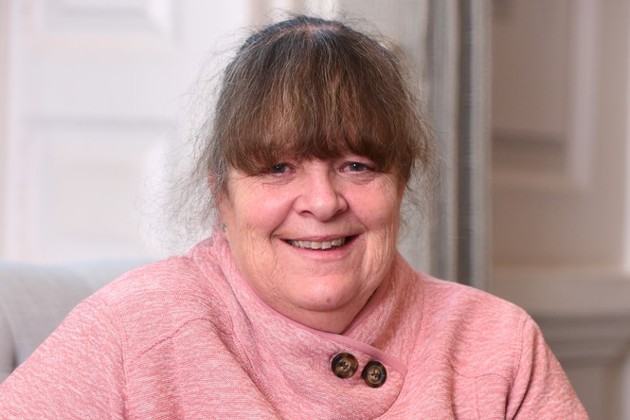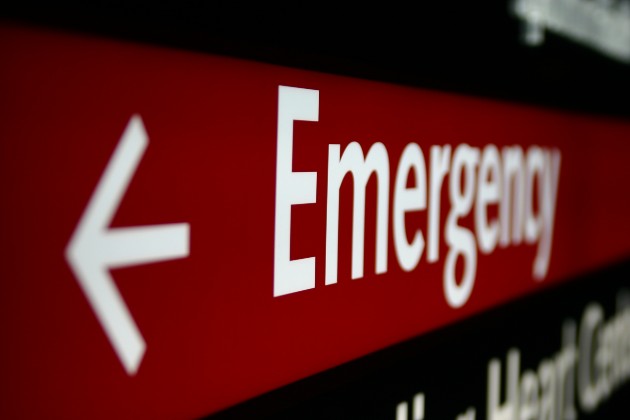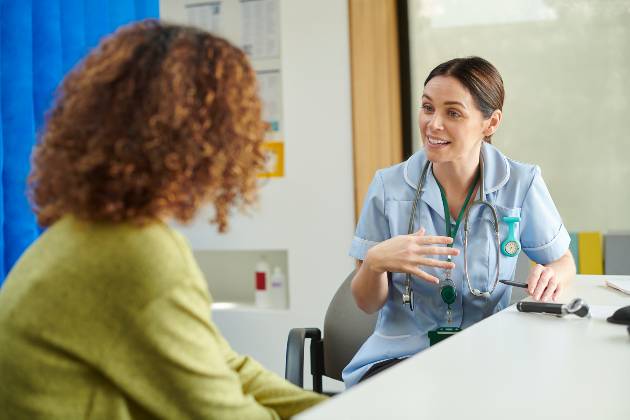In March 2020, hospitals across the UK were struggling to find beds for COVID-19 patients. “We had to discharge people quite quickly,” recalls Vicky Brotherton. “Although appropriate assessments were carried out beforehand, our trust wanted to put some extra support in place for patients.”
Vicky, who was a senior sister in ophthalmology at the time, was asked to take the lead in setting up a new telephone service to support safe discharge and patient wellbeing. Although the idea was to improve patient care, Vicky says the service also provides much-needed support to the nursing staff who spend time working in it.
Staff manning the phones in the Simple Discharge Service can work remotely, usually from home. When it was first set up, the service was staffed by nursing staff who were shielding or had been redeployed following COVID-19 risk assessments.
Vicky says: “The team’s job is to call patients following their discharge to make sure they’re OK. We carry out an assessment and answer any questions they might have. It gives the hospital staff confidence that any problems will be picked up and that patients will get the right support once they’ve been sent home.
“It also means that nursing staff who aren’t able to carry out their normal role can still use their nursing skills to care for patients. These staff members feel that they’re supporting their colleagues on the wards – this was really important during the first wave of COVID-19.”
People have told us it makes them feel like they’re being cared for as a person
Preventing serious incidents
Seconded to the role of clinical lead for the service, Vicky oversees the team, offering day-to-day support and clinical advice for complex cases. Patients have given positive feedback, and the service has also helped prevent harm and serious incidents.
“People have told us it makes them feel like they’re being cared for as a person and that they’re not just a number,” says Vicky. “As well as answering questions about medication and patients’ concerns, in some cases, we’ve had to act quickly to get people help.
“We spoke to one patient who had just had a fall and we phoned them an ambulance, and another person was in a pharmacy planning to buy paracetamol to take an overdose when we called. Although you can’t always predict these things, it shows how important a follow-up phone call can be.”
You need to be mindful of what people are going through
Initially, the service ran for two months until there was less demand on beds. In January 2021, when hospitals were yet again struggling with the pressures of the pandemic, Vicky was asked to restart it. That’s when she began to realise its potential to support nursing staff in the long term.
“The second time round, we didn’t have as many staff who needed to be redeployed,” explains Vicky. “So, I worked with HR to identify staff who were shielding. We found colleagues who were shielding because they were having chemotherapy or were pregnant, and colleagues on long-term sick leave, who wanted to join the team.
“We all work from our bedrooms, spare rooms or dining tables – all after an appropriate equipment assessment – and we’ve not met in person, but we have virtual team meetings every day and there’s an amazing team spirit. In the chaos and activity of the ward, sometimes those staff who are shielding or off sick don’t get that phone call or wellbeing check that they might need. It can be quite isolating.
“When they’re working as part of this team, we’re supporting their wellbeing every day and any concerns can be picked up. It’s been a lifeline for staff.”
It allows nursing staff who can’t work in their normal role to still make a valuable contribution
Vicky, who’s an RCN safety rep and steward, has used her experience to make sure staff get the right support. “You need to be mindful of what people are going through,” she says. “On one occasion, I noticed a team member didn’t seem herself. She’d recently had surgery due to breast cancer, so I gave her a ring and she told me she wasn’t coping. I directly contacted the lead cancer nurse specialist who arranged for a breast care nurse to give her a call and some support.
“That might not have been picked up if she’d been at home recovering from her surgery without much contact. It’s about those little things that you can do to make people’s lives better when they’re going through such a terrible time. That’s where the rep bit comes in.”
Supporting staff wellbeing
The service has also supported staff on long term sick leave when their own care has been impacted by the pandemic. “Some colleagues haven’t been able to have the surgery they’re waiting for because of lockdown or the impact COVID-19 has had on some services,” says Vicky. “This role has meant they can carry on working rather than go down to half pay and deal with all of the financial concerns that go along with that.”
With the benefits to both patients and nursing staff clearly demonstrated, Vicky wants the service to continue and has put a business case to her trust.
Vicky says: “In terms of benefits for the employer, as well as alleviating pressure within the hospital, improving the patient experience and most likely reducing hospital readmissions, this service supports staff with their mental health and wellbeing.
“It allows nursing staff who can’t temporarily work in their normal role to still make a valuable contribution to patient care, use their professional skills and be part of a team. Many staff who are unwell have even said they feel it’s helped them with their recovery or to cope with their illness.”
More information
The Simple Discharge Team supports patients who’ve had a hospital stay and aren’t already receiving support from a specialist nurse.
The team includes Vicky, as clinical lead, an administrator and six part-time members of nursing staff, which included nurses and health care assistants, carrying out phone assessments.
Since the service was restarted in January 2021, the team has contacted almost 9,000 patients, and an audit is being carried out to determine whether hospital readmissions have been reduced.
The service has been wound down again do to the current COVID-19 demand, but it is under review to become a longstanding fixture in the trust.








